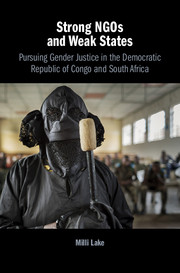 Strong NGOs and Weak States
Strong NGOs and Weak States 8 - Conclusion
NGOs and State (Un)Making
from Part II
Published online by Cambridge University Press: 04 May 2018
Summary
- Type
- Chapter
- Information
- Strong NGOs and Weak StatesPursuing Gender Justice in the Democratic Republic of Congo and South Africa, pp. 242 - 257Publisher: Cambridge University PressPrint publication year: 2018
